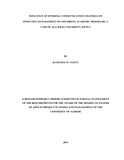| dc.description.abstract | The purpose of this study was to investigate influence of internal communication channels on effective management of University’s academic programs with specific focus to Aga Khan University. The study investigated whether face to face communication, telephone communication, written communication and computer mediated communication improves effective management. The target population was 284 staff where Krejcie and Morgan’s theory was employed in coming up with a sample size of 162. The study relied mostly on primary data sources where computer software SurveyMonkey was used to send out a web link hosting the questionnaire to the targeted respondents. Data collected was quantitative and qualitative which was analyzed using descriptive statistics and content analysis. A total of 106 staff participated giving a response rate of 65.43%. After data cleaning, 20.75% of the responses were incomplete which left 84 accurately completed ones for analysis; a true response rate of 51.85%. Demographically, 70.24% of the respondents were aged between 26 to 40 years, 54.76% were male, 48.81% were educated to a postgraduate level and most 75% worked at the Medical College. Of the Internal communication channels available at AKU-N majority showed a preference to receive information through Computer Mediated Media 90.48%, while use of written communication seemed almost obsolete at 13.10%. The study established that AKU-N handled its communication with staff by utilizing formal communication channels that allowed for information to be exchanged from top management to lower level staff and across departments that were necessary for any organization to function. In conclusion, the study showed that there is no one channel that AKU-N used as a wholesome solution for achieving effective management and that there is continuous feedback from management to ensure the organization coordinated and adjusted activities to maintain balance and promote effective management. The study recommends that AKU-N’s management considers formulating strategies to enhance retaining of its young well educated workforce and also capitalize on its employee’s preference for computer mediated commination channels by promoting modern technological modes of communication like social media, in addition to clearly laid out communication policy that will enlighten staff on the access and use of corporate information thus promoting employee awareness and growth, requisite components for effective management. For further research a study on the influence of Computer Mediated Channels on conflict resolution within an institution of higher learning is a relevant topic of study. | en_US |

